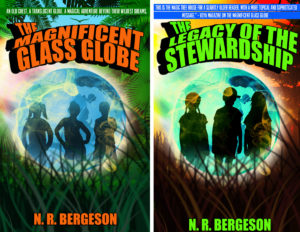“Discovering the World through Literacy”
A few weeks ago, I attended parent/teacher conferences for my fourth-grade daughter and second-grade son. Things certainly have changed in the days since I was a kid. The quantitative information, evaluation methodologies, and other assessment criteria provide some pretty amazing data. These data not only help to give me a clearer picture of how my kids are doing. They also give me important insight as to where I, as a parent, am able to provide any needed, additional support.
As I’ve talked to a number of teacher friends, I’ve learned that while these data and information, are often very helpful, they can also be, at times, somewhat limiting. Much of these limits are tied to various federal requirements, state laws, and school board emphases. A lot of direction and input has been aimed at our schools. While they provide clear standards and quantitative systems of evaluation, they also can end up restricting what teachers can and can’t do. In addition, the added requirements often end up eating up the lion’s share of finite minutes in every day that a teacher has to, well, you know … teach.
One area that many teachers feel has gotten the “short end of the stick” in this new environment is social studies learning. Whether history, geography, sociology, or others, these bottomless subjects – subjects that relate so directly to the real world – end up getting put in second place to the traditional education areas of reading, writing, and arithmetic, as well as a renewed emphasis on strengthening STEM education topics such as science and computers.
Don’t get me wrong, I know that all of these are not only very important. They are essential in the world today, and in large part shape our success when it comes to society as a whole. But as one who studied the social sciences extensively, and who has spent most of my career in the field, I do wish my kids were learning more on these topics.
For me, the area of my greatest passion is anything associated with global education. Geography, cultures, foreign languages, geopolitics, and more. Since we all live on the same planet, I strongly believe that we are all better off when we know as much about it – and about the different groups of our fellow earthlings – as we possibly can. After spending a decade working as a U.S. diplomat, living in seven countries, and traveling to nearly seventy countries, this passion has only grown.
A few years ago, while discussing my desire for a greater emphasis on global education in schools, a teacher friend of mine offered up a novel idea – finding ways to teach about the globe through literacy (pun intended).
In many ways, this notion helped shape my vision for the “Magnificent Glass Globe” series. By writing age-appropriate fiction, keeping it fast-paced and entertaining, but at the same time packing it with tidbits of knowledge about the world, cultures, and real global issues, I realized just how much one could experience a place and expand their horizons when reading a book.
The idea wasn’t to make things too heavy handed. Not a preachy textbook disguised as an adventure. But realizing that both literacy and global education could indeed go hand in hand. Then putting the two together in real, meaningful stories about the world.
After all, our world is full of stories. Those stories relate to real groups of people. Those people live in real places. Those places have real histories, environments, and cultures.
At the same time, given the realities of today’s quantitative education focus on things like reading and literacy, I wanted to provide teachers with a tool that they could kill the proverbial two birds with one stone (or, as my bird-loving younger brother prefers I say, “feed two dogs out of one dish”).
My suggestion to writers is that, whenever cooking up a new story, they consider taking it as an opportunity to immerse readers in some corner of the social-science universe. Historical fiction is a great genre for this. So are cultural stories. Don’t shy away from digging into cultures and societies that may not be as familiar to you – that’s what research is for! Of course, follow the “nothing about them, without them” principle – when incorporating cultural variation into your stories, it is essential to get the input from those who truly hold identity within that culture. Luckily, there are millions of people around this world who are eager and willing to share their identity with you, and to help make sure that it comes out correct on the page.
My suggestion for teachers is to seek out good books that are filled with social and global topics. There are thousands of good examples out there. Teaching valuable topics like reading comprehension can take on another element of social understanding. The questions almost write themselves.
Finally, for readers, I encourage you to share what you are learning about the world in books. It can give others the chance to see that books are often more than just an entertaining jaunt through the lives of a set of characters. There is always a social foundation upon which our characters’ identities are built. This is valuable, real world information that can really make a difference as we get a better grasp on it.
It’s amazing how much one can truly learn through a story.
Book 1 Published April 4th, 2017
Book 2 Published March 3rd, 2020
by Tantrum Books
About The Magnificent Glass Globe #2: The Legacy of the Stewardship: Several months after their unexpected adventure in the Amazon, Ike is not happy. He’s tired of being picked on and being treated like a baby. But when the kids learn Anatoly has kidnapped a group of innocent children and is holding them ransom in the forests of Siberia, Ike knows he has to do something. But Anatoly demands a steep price; they must hand over the globe.
When Grandpa suffers a heart attack, Ike, Mary, and Helen decide to help the other kids. Reluctantly, they decide to use the globe once again. Only this time, they leave better prepared. Or so they thought. When they arrive in Russia, they quickly learn that their problems are much bigger than just Anatoly. When a mysterious group of people appear using a second globe, Mary is kidnapped, and now it is up to Ike and Helen to cross the vast country and find her.
About the Author: N. R. (Nils) Bergeson is the author of the “Magnificent Glass Globe” series. From an early age, he was fascinated with the wider world, prompting him to seek a career that would give him opportunities for ample adventure. This led N.R. to spend twelve years overseas – in Siberia, Romania, Colombia, Kazakhstan, Afghanistan, and Indonesia. He’s traveled to more than 65 countries with his wife, Emily, and their three young children. N.R.’s love for writing complements his globetrotting ways well. He hopes his writing will instill a desire in his readers to take advantage of modern opportunities to see the world, learn new languages, and expand their cultural experiences. We live in a wonderful world, and it’s just waiting for us to see it.
Instagram: @nilsbergeson
Facebook: Nils Bergeson
Twitter: @NRBergeson
Thank you, Nils, for the reminder to not forget about the social sciences!


